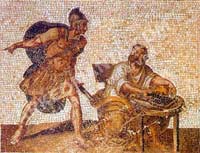During the ancient Greek period, small wars frequently erupted between small nations, and Archimedes, residing in the tiny city-state of Syracuse, was no exception. At the age of 73, he actively participated in defending his homeland.
The enemy forces were incredibly powerful, led by an arrogant and cruel admiral commanding 60 ships as they advanced menacingly towards Syracuse.
 Archimedes was well-prepared for the battle; he devised a catapult that resembled today’s slingshots used for bird hunting, capable of launching stones weighing hundreds of kilograms.
Archimedes was well-prepared for the battle; he devised a catapult that resembled today’s slingshots used for bird hunting, capable of launching stones weighing hundreds of kilograms.
As the enemy approached, Archimedes commanded, “Fire!” Stones were hurled from the city walls, striking enemy ships and causing significant damage. The enemy was terrified and retreated in disarray. Suffering losses, they regrouped to strategize for a new attack. Some suggested an assault at night, without lights or horns, to silently approach the walls of Syracuse, where Archimedes’ inventions would be rendered ineffective.
The enemy leader laughed, declaring, “Let those detestable stones fall into the deep sea to frighten the fish. Tomorrow, we will stand at the palace of Syracuse.”
As night fell, the sea was silent except for the sound of waves crashing against the rocky shore, while the enemy’s warships quietly approached the city.
At this moment, the enemy soldiers had set up ladders and were preparing to break through the city gates.
From above, the sound of “creaking” echoed, and shadows were seen moving along the walls. “We are not afraid; those large stones cannot hit us,” thought the commanding officer. Yet, despite his bravado, unease lingered among the enemy ranks.
 The “creaking” sound grew louder and more ominous. What was Archimedes up to? Archimedes was directing his soldiers to prepare another catapult, but this time it was different. He affixed a broad, thin board to some ox tendons, filling one end with large stones of various sizes. These tendons were connected to a crank mechanism, and when tightly twisted, releasing them would launch the board upwards, sending stones flying into the air to strike enemy ships and soldiers as they closed in, including one stone that hit the enemy commander directly.
The “creaking” sound grew louder and more ominous. What was Archimedes up to? Archimedes was directing his soldiers to prepare another catapult, but this time it was different. He affixed a broad, thin board to some ox tendons, filling one end with large stones of various sizes. These tendons were connected to a crank mechanism, and when tightly twisted, releasing them would launch the board upwards, sending stones flying into the air to strike enemy ships and soldiers as they closed in, including one stone that hit the enemy commander directly.
The foe was forced to accept defeat once again. However, unwilling to concede, they launched a third attack.
A sudden thought struck Archimedes: “Yes, let us use this method; the sun is a god. May it aid me in saving the good people of Syracuse.” He resolutely commanded that every woman must bring her polished mirror to gather at the shoreline.
The enemy, witnessing many women in white dresses on the beach, grew suspicious. The commander wondered, “Why aren’t they hiding? What are they doing standing there?” But seeing that the women were unarmed eased his concerns, and he ordered the ships to advance, ready to attack.
Suddenly, a blinding ray of light shone from the harbor. Then, beams of light converged into a single point, radiating intense heat. It struck the large sail of the leading warship, which began to emit smoke, accompanied by the acrid smell of burning fabric. Just as the crew was perplexed, a panicked shout arose: “Oh no, the sail is on fire!”
 Everyone on the ship scrambled to extinguish the flames but could not reach them. The gentle sea breeze fanned the flames, which leaped higher and quickly engulfed the entire sail. Soon, the mast caught fire, and the deck was ablaze, transforming the ship into a floating inferno, forcing the soldiers on board to leap into the sea to escape.
Everyone on the ship scrambled to extinguish the flames but could not reach them. The gentle sea breeze fanned the flames, which leaped higher and quickly engulfed the entire sail. Soon, the mast caught fire, and the deck was ablaze, transforming the ship into a floating inferno, forcing the soldiers on board to leap into the sea to escape.
The glowing beams from the shore sought out the enemy vessels, and soon the second and third ships were also ablaze, creating a sea of fire. From the generals to the soldiers, panic spread, and the arrogant commander had no choice but to order a retreat.
The small city of Syracuse triumphed over its foes once more, without the use of any weapons, and none of their soldiers were injured or killed. They revered and respected Archimedes, whose intellect became the pride of the people of Syracuse.
Give me a place to stand, and I will move the Earth.
—- Archimedes —-
—————————————————————-
Return to the article “Archimedes – The Great Scientist of Ancient Greece”
Stay tuned for more: “Archimedes – Don’t ruin my drawing!”


















































